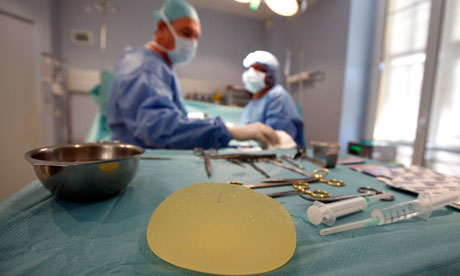
More than 2,800 women have been formally referred for NHS care having received breast implants at the centre of a global health scare at private clinics, according to government figures.
The Department of Health statistics show that as of 12 February a total of 2,860 women in England had been referred to the NHS by their GP because the clinics which carried out the procedures had failed to help or had closed. Of that number, 565 were referred in the preceding week alone.
So far, almost 1,800 of the women have had an outpatient appointment, with 1,140 undergoing scans and 79 either having the implants removed or being scheduled for such an operation.
The numbers give a further sense of the potential impact to the NHS of the revelation that a French manufacturer of breast implants, Poly Implant Prothese (PIP), manufactured them using a non-medical grade silicone. The company was closed down in March 2010 with its founder, Jean-Claude Mas, 72, later placed under investigation on a criminal charge of causing bodily harm.
The government has said it will provide free care to British women affected, but plans to recover costs from the private clinics. The new figures show that 477 of the women referred to the NHS so far received implants from the Harley Medical Group, with 91 from Transform and the remainder listed as "other", which might include some from Harley and Transform.
News of the potential health risk spread rapidly since December, when the French government advised 30,000 women to have substandard PIP implants removed following warnings that they were more likely to rupture than other implants.
The firm – at one time the third-biggest global supplier of breast implants – cut costs by using its own concoction, not approved for medical use, which included a mix of agricultural and industrial grade-silicone. While 40,000 British women have the PIP implants, the government has said there is no urgent clinical need for all of them to have these removed.
Some UK private clinics immediately agreed to free removal of the affected implants. Others took a different position.
Transform initially refused before saying last month that all patients who received PIP implants since the start of 2001 would have free scans and the offer of removal, although replacement will cost £2,500 if warranties have run out.
Harley Medical Group, which fitted the implants to almost 14,000 British women, will remove them from those who underwent operations in the last 10 years but only if they have suffered a rupture and have a scan as proof. If they were put in within the last six years, patients will be eligible for a replacement and, between six and 10 years, patients will be charged cost price to replace the implants.
The junior health minister, Anne Milton, said: "Most patients who have been forced to get help from the NHS because their private clinic has refused to support them seem, so far, to be choosing not to have their implants removed. This appears to show that these women are getting the reassurance they need from speaking to an expert or having a scan.
"All but one of the NHS hospitals that used PIP implants have been able to contact all their patients. They have been offered a consultation with a specialist. The expert group does not believe there is enough evidence to advise women to have their implants removed. But it is right that women should be able to seek reassurance from a specialist."

